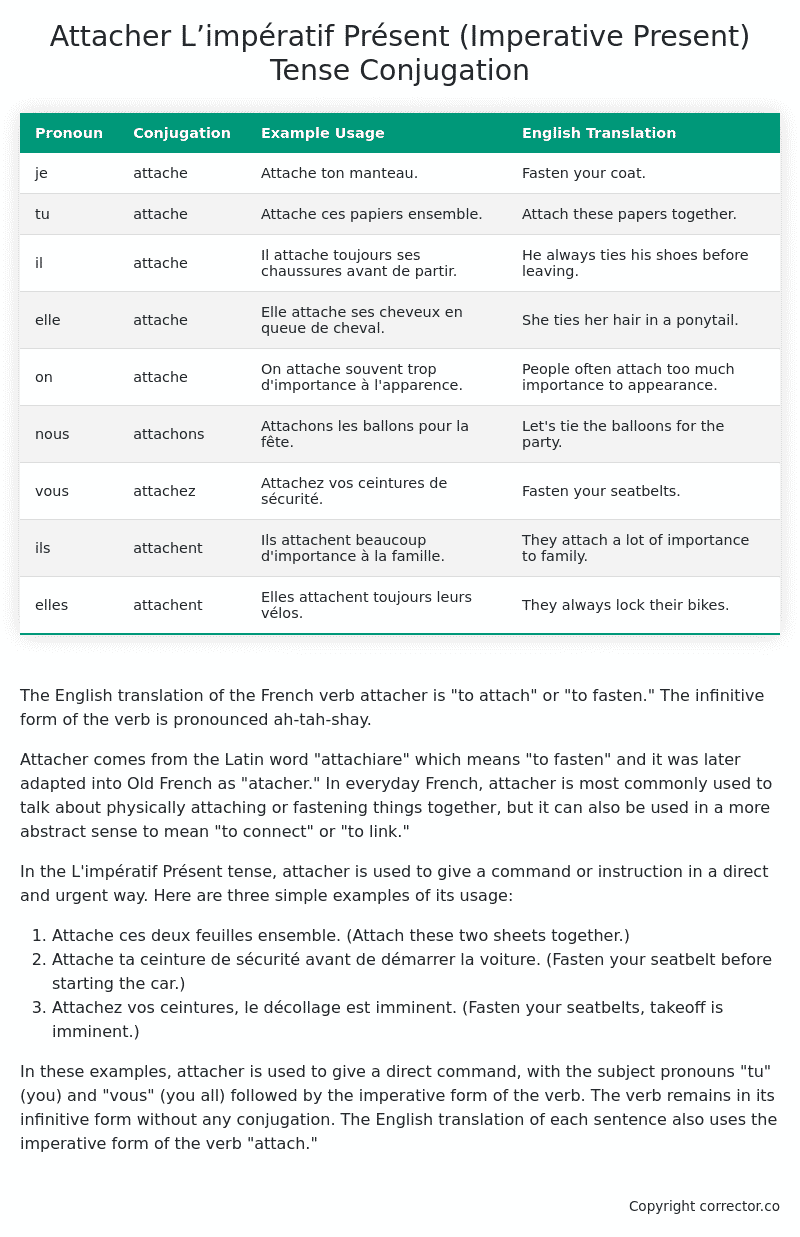L’impératif Présent (Imperative Present) Tense Conjugation of the French Verb attacher
Introduction to the verb attacher
The English translation of the French verb attacher is “to attach” or “to fasten.” The infinitive form of the verb is pronounced ah-tah-shay.
Attacher comes from the Latin word “attachiare” which means “to fasten” and it was later adapted into Old French as “atacher.” In everyday French, attacher is most commonly used to talk about physically attaching or fastening things together, but it can also be used in a more abstract sense to mean “to connect” or “to link.”
In the L’impératif Présent tense, attacher is used to give a command or instruction in a direct and urgent way. Here are three simple examples of its usage:
- Attache ces deux feuilles ensemble. (Attach these two sheets together.)
- Attache ta ceinture de sécurité avant de démarrer la voiture. (Fasten your seatbelt before starting the car.)
- Attachez vos ceintures, le décollage est imminent. (Fasten your seatbelts, takeoff is imminent.)
In these examples, attacher is used to give a direct command, with the subject pronouns “tu” (you) and “vous” (you all) followed by the imperative form of the verb. The verb remains in its infinitive form without any conjugation. The English translation of each sentence also uses the imperative form of the verb “attach.”
Table of the L’impératif Présent (Imperative Present) Tense Conjugation of attacher
| Pronoun | Conjugation | Example Usage | English Translation |
|---|---|---|---|
| je | attache | Attache ton manteau. | Fasten your coat. |
| tu | attache | Attache ces papiers ensemble. | Attach these papers together. |
| il | attache | Il attache toujours ses chaussures avant de partir. | He always ties his shoes before leaving. |
| elle | attache | Elle attache ses cheveux en queue de cheval. | She ties her hair in a ponytail. |
| on | attache | On attache souvent trop d’importance à l’apparence. | People often attach too much importance to appearance. |
| nous | attachons | Attachons les ballons pour la fête. | Let’s tie the balloons for the party. |
| vous | attachez | Attachez vos ceintures de sécurité. | Fasten your seatbelts. |
| ils | attachent | Ils attachent beaucoup d’importance à la famille. | They attach a lot of importance to family. |
| elles | attachent | Elles attachent toujours leurs vélos. | They always lock their bikes. |
Other Conjugations for Attacher.
Le Present (Present Tense) Conjugation of the French Verb attacher
Imparfait (Imperfect) Tense Conjugation of the French Verb attacher
Passé Simple (Simple Past) Tense Conjugation of the French Verb attacher
Passé Composé (Present Perfect) Tense Conjugation of the French Verb attacher
Futur Simple (Simple Future) Tense Conjugation of the French Verb attacher
Futur Proche (Near Future) Tense Conjugation of the French Verb attacher
Plus-que-parfait (Pluperfect) Tense Conjugation of the French Verb attacher
Passé Antérieur (Past Anterior) Tense Conjugation of the French Verb attacher
Futur Antérieur (Future Anterior) Tense Conjugation of the French Verb attacher
Subjonctif Présent (Subjunctive Present) Tense Conjugation of the French Verb attacher
Subjonctif Passé (Subjunctive Past) Tense Conjugation of the French Verb attacher
Subjonctif Imparfait (Subjunctive Imperfect) Tense Conjugation of the French Verb attacher
Subjonctif Plus-que-parfait (Subjunctive Pluperfect) Tense Conjugation of the French Verb attacher
Conditionnel Présent (Conditional Present) Tense Conjugation of the French Verb attacher
Conditionnel Passé (Conditional Past) Tense Conjugation of the French Verb attacher
L’impératif Présent (Imperative Present) Tense Conjugation of the French Verb attacher (this article)
L’infinitif Présent (Infinitive Present) Tense Conjugation of the French Verb attacher
Struggling with French verbs or the language in general? Why not use our free French Grammar Checker – no registration required!
Get a FREE Download Study Sheet of this Conjugation 🔥
Simply right click the image below, click “save image” and get your free reference for the attacher L’impératif Présent tense conjugation!

Attacher – About the French L’impératif Présent (Imperative Present) Tense
Usage
Giving commands
Making requests
Offering advice
Expressing desires
Conjugation Formation
Interactions with other tenses
Want More?
I hope you enjoyed this article on the verb attacher. Still in a learning mood? Check out another TOTALLY random French verb conjugation!


